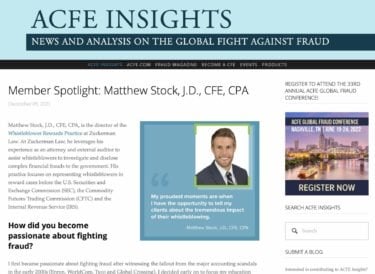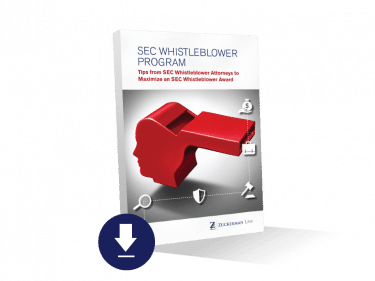Purpose of SOX Whistleblower Protection Law
When Congress enacted the Sarbanes-Oxley Act (SOX) in 2002, it included a whistleblower protection provision to combat a “corporate code of silence,” a code that “discourage[d] employees from reporting fraudulent behavior not only to the proper authorities, such as the Federal Bureau of Investigation and the SEC, but even internally.” S. Rep. No. 107-146, at 4–5 (2002). Congress sought to empower whistleblowers to serve as an effective early warning system and help prevent corporate scandals and to “encourage and protect [employees] who report fraudulent activity that can damage innocent investors in publicly traded companies.” S.Rep. No. 107-146, at 19 (2002)
Congress enacted SOX “to safeguard investors in public companies and restore trust in the financial markets following the collapse of Enron Corporation.” Lawson v. FMR LLC, 571 U.S. 429, 432 (2014); see also S. Rep. No. 107-146, pp. 2-11 (2002). Enron employees who attempted to report corporate misconduct had faced retaliation. “Congress therefore identified the lack of whistleblower protection as ‘a significant deficiency’ in the law, for in complex securities fraud investigations, employees ‘are [often] the only firsthand witnesses to the fraud.’” Lawson, 571 U.S. at 435 (quoting S. Rep. No. 107-146 at 10).
Congressional hearings about the Enron scandal probed why such a massive fraud was not detected earlier. The testimony and documents revealed that when “employees of Enron and its accounting firm, Arthur Andersen, attempted to report corporate misconduct, Congress learned, they faced retaliation, including discharge.” Lawson v FMR LLC, 134 S.Ct. 1158, 1162 (2014). And there was essentially no legal protection for whistleblowers, such as Sherron Watkins, who tried to stop the fraud.
Courageous Enron whistleblower Sherron Watkins blew the whistle to Enron executives and suffered retaliation for her whistleblowing. Her riveting Congressional testimony helped spur Congress to enact the robust corporate whistleblower protection provision in the Sarbanes Oxley Act.
Congress passed the SOX Act “after a series of celebrated accounting debacles.” Free Enterprise Fund v. Public Co. Accounting Oversight Bd., 561 U.S. 477 2010). Those disasters, led by the massive Enron and Arthur Anderson scandals, inflicted significant “spillover economic effects” through the nation, prompting bankruptcies and massive job losses countrywide and undermining public confidence in the domestic and international securities markets. Skilling v. United States, 561 U.S. 358, 376 (2010).
Individual Senate sponsors of SOX—of both political parties— stressed the dangers of erecting barriers to whistleblowers coming forward. Senator Richard Durbin said that SOX Section 806, codified at 18 U.S.C. §1514A, “creates protections for corporate whistleblowers. We need them. If insiders don’t come forward, many times you don’t know what is happening in large corporations.” Senate Banking Committee Legis. History, Vol. III, at 1294. Senator Lindsay Graham stated that the whistleblower protection provisions of the statute are “designed to prevent investors from corporate greed.” Senate Banking Comm. Legis. History, Vol. III, at 1461. Other members of the Senate Banking Committee echoed the remarks of Senators Graham and Durbin. See, e.g., Remarks of Senator Patrick Leahy, Banking Comm. Legis. History, Vol. III, at 1231-33, 1273 (protecting whistleblowers advances SOX’s goals of transparency, forthright financial decision making, and accountability); Remarks of Senator Barbara Boxer, id. at 1526 (characterizing SOX § 806 as an “antifraud protection measure” and describing a proposed House Bill as “weak” due to its failure to protect whistleblowers).
In Walters v. Deutsche Bank AG, ALJ No. 2008-SOX-070, slip op. at 34-38 (Mar. 23, 2009), Judge Levin surveyed the legislative history of SOX:
Time and again, the legislative history of Sarbanes-Oxley reflects Congressional appreciation for the important antifraud contribution whistleblowers can make and the unique role inside whistleblowers can play in deterring financial fraud and misrepresentation. The role Congress envisioned for the whistleblower was best described by Senator Leahy: “When sophisticated corporations set up complex fraud schemes, corporate insiders are often the only ones who can disclose what happened and why.” See, Senate Banking Committee Legis. History,Vol. III. at 1300-01. . . . Senator Leahy justified the protection Section 806 affords to whistleblowers based on the importance of the unique, inside, financial perspective they can provide. Worker protection in Section 806 is not an end in itself, it is simply a method designed to encourage insiders to come forward without fear of retribution. As Senator Leahy‘s comments confirm: “We learn from Sherron Watkins of Enron that these corporate insiders are the key witnesses that need to be encouraged to report fraud and help prove it in court. Look what [Enron was] doing on this chart. There is no way we could have known about this without that kind of a whistleblower.” See, Senate Banking Committee Legis. History, Vol. III, at 1632 . . . As Senator Grassley noted, the WorldCom situation, among others, demonstrated that: “if fraud is repeatedly covered up by corporate insiders or contrived to defeat established internal controls,” even a company’s external auditors may not detect the financial misrepresentations. See, Senate Banking Committee Legis. History ,Vol. III, at 1498 (emphasis added).
In light of the statute’s remedial purpose, courts should construe Section 806 broadly. Mahony v. KeySpan Corp., No. 04 Civ. 554(SJ), 2007 WL 805813, at *5 (E.D. N.Y. Mar. 12, 2007) (“The law was intentionally written to sweep broadly, protecting any employee of a publicly traded company who took such reasonable action to try to protect investors and the market.” (citing 149 Cong. Rec. S1725–01, S1725, 2003 WL 193278 (Jan. 29, 2003))).
SOX Whistleblower Protection Law
Our experienced SOX whistleblower lawyers represent corporate whistleblowers nationwide in high-stakes whistleblower retaliation cases and have obtained substantial recoveries for CEOs, CFOs, auditors, accountants, risk managers, CISOs, and other executives and senior professionals. Click here to read reviews from senior executives and professionals that we represented in whistleblower retaliation matters.






To learn more about the Sarbanes-Oxley corporate whistleblower protection law, download our free guide Sarbanes-Oxley Whistleblower Protection: Robust Protection for Corporate Whistleblowers.
Sarbanes-Oxley Whistleblower Retaliation Damages and Remedies
Why Hire Leading SOX Whistleblower Law Firm Zuckerman Law
- U.S. News and Best Lawyers® have named Zuckerman Law a Tier 1 firm in Litigation – Labor and Employment in the Washington DC metropolitan area.
- Matt Stock is a Certified Public Accountant, Certified Fraud Examiner and former KPMG external auditor. As an auditor, Stock developed expertise in financial statement analysis and internal controls testing and fraud recognition. He uses his auditing experience to help IRS, CFTC and SEC whistleblowers investigate and disclose complex financial frauds to the government and develop a roadmap for the SEC to take an enforcement action. Matt has been interviewed on CNBC, quoted extensively about whistleblower rewards in the media, and is the lead author of SEC Whistleblower Program: Tips from SEC Whistleblower Attorneys to Maximize an SEC Whistleblower Award.Recently the Association of Certified Fraud Examiners published a profile of Matt Stock’s success working with whistleblowers to fight fraud:

- Dallas Hammer has extensive experience representing whistleblowers in retaliation and rewards claims and has written extensively about cybersecurity whistleblowing. He was selected by his peers to be included in The Best Lawyers in America® in the category of employment law in 2021 and 2022.
- Described by the National Law Journal as a “leading whistleblower attorney,” founding Principal Jason Zuckerman has established precedent under a wide range of whistleblower protection laws and obtained substantial compensation for his clients and recoveries for the government in whistleblower rewards and whistleblower retaliation cases. He served on the Department of Labor’s Whistleblower Protection Advisory Committee, which makes recommendations to the Secretary of Labor to improve OSHA’s administration of federal whistleblower protection laws. Zuckerman also served as Senior Legal Advisor to the Special Counsel at the U.S. Office of Special Counsel, the federal agency charged with protecting whistleblowers in the federal government. At OSC, he oversaw investigations of whistleblower claims and obtained corrective action or relief for whistleblowers.
- Zuckerman was recognized by Washingtonian magazine as a “Top Whistleblower Lawyer” (2020, 2018, 2017, 2015, 2009, and 2007), selected by his peers to be included in The Best Lawyers in America® in the category of employment law (2011-2021) and in SuperLawyers in the category of labor and employment law (2012 and 2015-2021), is rated 10 out of 10 by Avvo, based largely on client reviews, and is rated AV Preeminent® by Martindale-Hubbell based on peer reviews
- We have published extensively on whistleblower rights and protections, and speak nationwide at seminars and continuing legal education conferences. We blog about new developments under whistleblower retaliation and rewards laws at the Whistleblower Protection Law and SEC Awards Blog, and in 2019, the National Law Review awarded Zuckerman its “Go-To Thought Leadership Award” for his analysis of developments in whistleblower law.
- Our attorneys have been quoted by and published articles in leading business, accounting, and legal periodicals, including The Wall Street Journal, Forbes, CNBC, MarketWatch, Vox, Accounting Today, Going Concern, Law360 – Expert Analysis, Investopedia, The National Law Review, inSecurities, Government Accountability Project, S&P Global Market Intelligence, Risk & Compliance Magazine, The D&O Diary, The Compliance and Ethics Blog, Compliance Week and other printed and electronic media.
SEC Whistleblower Reward Program
We are also one of the leading law firms representing whistleblowers worldwide before the SEC, and indeed our attorneys represented whistleblowers at the SEC before the enactment of the Dodd-Frank Act. We helped shape the SEC rules implementing the SEC Whistleblower Program, and have represented whistleblowers in disclosing a wide range of violations of federal securities laws, including:
- Accounting fraud;
- Investment and securities fraud;
- Foreign bribery and other FCPA violations;
- EB-5 investment fraud;
- Manipulation of a security’s price or volume;
- Fraudulent securities offerings and Ponzi schemes;
- Hedge fund fraud;
- Unregistered securities offerings;
- Investment adviser fraud;
- Anti-money laundering program violations;
- False or misleading statements about a company or investment;
- Inadequate internal controls;
- Deceptive non-GAAP financial measures; and
- Violations of auditor independence rules.
If you have original information that you would like to report to the SEC, contact an experienced SEC whistleblower attorney at Zuckerman Law for a free, confidential consultation by calling 202-262-8959.
To learn more about the SEC Whistleblower Program, download our free guide SEC Whistleblower Program: Tips from SEC Whistleblower Attorneys to Maximize an SEC Whistleblower Award.
Qualifying for an SEC Whistleblower Award: Tips for SEC Whistleblowers
5 Tips for SEC Whistleblowers and Lessons Learned from SEC Whistleblower Awards
SEC Whistleblower Program and SEC Whistleblower Awards
Client Reviews from Executives and Senior Professionals in SOX Whistleblower Retaliation Matters
“Jason is the consummate professional when it comes to SOX retaliation claims. He is, without question, one of the most deeply knowledgeable, technical, and astute attorneys in this very specialized body of law. During one of the most difficult times in my professional career, Jason not only provided exceptional legal guidance, but equally as important, he provided emotional support that was vital to my family and me. Jason ran circles around the “major national law firm” team that was assigned to defend my employer. In fact, Jason made them look silly at times. Jason always advocated my best interests, not his own. Jason is not only an exceptional attorney who helped my family to achieve a favorable outcome, but he is a friend. I’ve worked with major law firms throughout my career and when it comes to SOX and employment law matters, there is not a finer, more talented attorney than Jason Zuckerman.”
“Jason is everything you could possibly ask for an an attorney: highly intelligent, thoughtful, and extraordinarily knowledgeable in his specialty of the law. In a very short period of time Jason was able to assimilate a laundry list of details and offer a compelling strategy on how to effectively proceed. Moreover, he is extremely responsive.”
“Jason did an exceptional job in quickly understanding the intricacies of my case, grasping not only his field of expertise of employment law, but also the violations of law and SEC Regulations that were central to my dispute. The overall strategy he utilized insured that opposing counsel was challenged and made clear that this case would simply not proceed based on a timetable convenient to them. Jason is thorough, accurate and seemingly working at all hours based on phone calls and correspondence. Fortunately Jason has a very down to earth personality, understands issues readily and can convey in understandable language current “legal” circumstances and probable outcomes. I would easily and thoroughly recommend Jason for issues related to a Sarbanes-Oxley or employment related dispute.”
“I selected Jason to handle my case after consulting with three other lawyers because of his extensive SOX experience and negotiation skills. My decision paid off as he easily surpassed all of my expectations. He quickly analyzed the merits of my case and aggressively engaged my former employer to reach a favorable settlement, avoiding years of potential litigation. He was responsive, professional, ethical and a great advocate on my behalf. I truly believe that I could not have found a better lawyer to represent my interests. He would be the first person I would recommend if a colleague or friend were to ever need similar services. Put simply, Jason is a top notch lawyer who works tirelessly to achieve a positive outcome for his clients. It’s easy to see why he is regarded as an expert in the field.”
“Jason Zuckerman is the most focused, thoughtful and aggressive attorneys I have ever known, let alone had the pleasure to have on my side in a highly complex legal case. He brought well-honed legal insights and a rapid pace to our legal preparations. He forcefully brought those preparations to the opposing side, which gave them little choice but to engage with us until a positive settlement was reached. In addition, we found Jason to be extremely responsive at every step, even if it required working past midnight. His character is beyond reproach and his dedication through the entire process was unwavering. If I ever need someone in my legal court again, I won’t hesitate for even a second, before I seek Jason’s support.”





